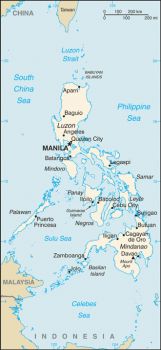The violent situation in the Philippines continues. However, the most recent news is somewhat encouraging. Ruben Pestano Lavilla Jr., who was wanted for the Philippines' worst militant attack has been arrested in Bahrain and returned to Manila. He was allegedly involved in the 2004 bombing of a ferry that killed 116 people. He was also allegedly the brains behind the Rajah Solaiman Movement (RSM), which has been linked to two other al-Qaeda connected organizations (Jemaah Islamiyah and Abu Sayyaf). It was only a couple of months ago that the UN Security Council added the RSM to the "UN 1267 Committee's Consolidated List of Individuals and Entities Affiliated with Al-Qaeda, the Taliban, or Usama bin Ladin." On June 16, 2008, the U.S. Department of State then designated the group and its leader as Specially Designated Global Terrorists. Meanwhile, some high estimates are that as many as 360,000 people have been displaced in the Philippines, particularly as a result of the collapse of the peace deal on August 5. The peace negotiations began 11 years ago and a ceasefire has actually been in place since 2003. Agence France Presse this past week reported that government troops overran at least 15 camps of the Moro Islamic Liberation Front and reminds readers the peace deal "would have granted Muslims their own separate state across more than 700 villages in Mindanao, but the Supreme Court on August 4 halted the pact, triggering the latest bout of fighting." Over the course of the 40-year conflict, more than 120,000 people have died. The Moro Islamic Liberation Front has been waging a rebellion since 1978. Last Friday, the Muslim leaders of the country called for peace and justice in Mindanao and 43 religious leaders and scholars signed a statement that appealed to the parties to honor the agreement on mutual cessation of hostilities. Meanwhile, tonight is the first night of the holy month of Ramadan, and apparently Philippine troops will continue their battles against Muslim rebels in the south , albeit with a bit more deference.

Map from the following source